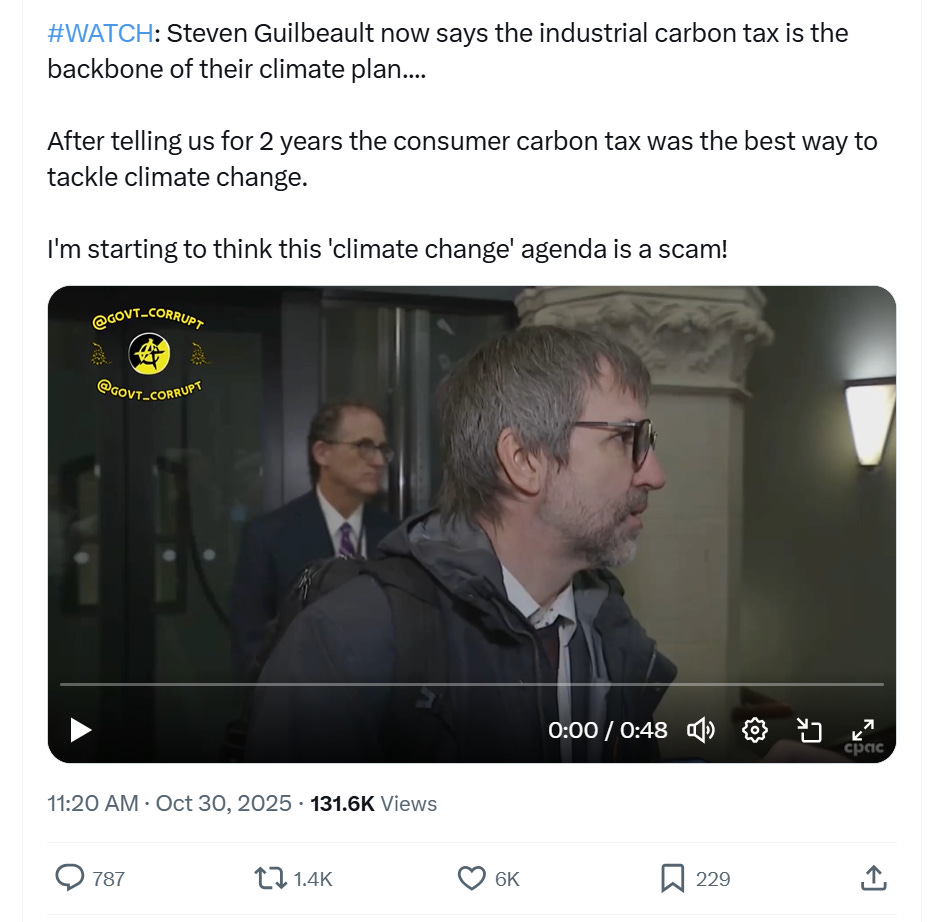Guilbeault calls industrial carbon tax “backbone” of Carney climate agenda
Steven Guilbeault, the former environment minister and vocal climate activist, is championing the Liberals’ industrial carbon tax as the linchpin of their climate agenda.
Steven Guilbeault, the former environment minister and vocal climate activist, is championing the Liberals’ industrial carbon tax as the linchpin of their climate agenda, even as Canadians grapple with rising costs.
Prime Minister Mark Carney will table his federal budget in the House of Commons next week. Guilbeault, who now serves as the Minister of Canadian Identity and Culture, was asked by media what he’d like to see included as a “staunch environmentalist.”
“Clearly climate change continues to be an important issue,” Guilbeault told reporters on Parliament Hill on Friday. “I can’t comment on what might or might not be in the budget, obviously. Like you, I’m very eager to see what will be in it, but industrial carbon pricing is a key component of our climate change strategy.”
Guilbeault went on to say that the industrial carbon tax was the “backbone” of the Liberals’ climate policy.
“For those who would’ve forgotten, it gives us three times more emission reduction than the consumer carbon pricing, so eager to see what will be in the budget,” he added.
The Liberals reduced their consumer carbon pricing scheme to zero in the lead-up to the last general election in April but kept its industrial carbon pricing scheme.
While the Liberals have claimed the consumer carbon tax is gone, it technically still exists and could be reintroduced at any time. For the tax to truly be done with, it would require a vote in the House of Commons to have it repealed.
On the campaign trail, Carney told Canadians that the industrial carbon tax would not touch the wallets of everyday Canadians. However, when cornered about it in an interview earlier this year, he admitted that they would be paying for it, but only a “marginal amount.”
Whether or not the amount is “marginal” for consumers, it’s certainly weighing heavily on the steel industry, a sector that has been struggling in the wake of U.S. tariffs.
The taxes steel manufacturers are forced to pay are simply then passed on to the consumer.
Despite industry claims, Carney has maintained that the steel industry actually benefits from the “value” of the industrial carbon tax and due to its predictability.
Guilbeault’s high praise of the industrial levy comes only one day after long-time environmental alarmist and billionaire Bill Gates announced that he would be dramatically changing his tune on climate change.
According to the Microsoft co-founder, climate change and carbon emissions “will not lead to humanity’s demise,” and “people will be able to live and thrive in most places on Earth for the foreseeable future.”
Gates wrote an article on his personal website, GatesNotes, which said emissions projections are down, and that people should no longer subscribe to the “doomsday view of climate change.”
“Unfortunately, the doomsday outlook is causing much of the climate community to focus too much on near-term emissions goals, and it’s diverting resources from the most effective things we should be doing to improve life in a warming world,” wrote Gates on Thursday.
“It’s not too late to adopt a different view and adjust our strategies for dealing with climate change.”
His recommendation to temper climate alarmism appears directed at global leaders gathering for COP30, a climate summit in Brazil next month.
Gates stated that while climate change is “serious,” governments “can’t cut funding for health and development” programs to fight it.
“It’s time to put human welfare at the centre of our climate strategies, which includes reducing the Green Premium to zero and improving agriculture and health in poor countries,” he continued.
“This is a chance to refocus on the metric that should count even more than emissions and temperature change: improving lives. Our chief goal should be to prevent suffering, particularly for those in the toughest conditions who live in the world’s poorest countries.”





guilbeault = one of the worst lying liberals.
Just one more reason to get out of out. Alberta Independence, live free or stay and die a slow, maybe not so slow, death.